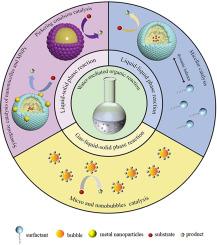Recent advances in water-mediated multiphase catalysis |
| |
| Affiliation: | 1. CNRS, CEMHTI UPR3079, Univ. Orléans, 1D Avenue de La Recherche Scientifique, Orléans, France;2. RS2E, CNRS FR3459, 15 Rue Baudelocque, Amiens, France;1. STEM College, School of Science, RMIT University, Melbourne, VIC 3000, Australia;2. Department of Biomedical Engineering, Graeme Clark Institute, University of Melbourne, Parkville, VIC 3010, Australia;3. CSIRO Manufacturing, Clayton, Victoria 3168, Australia;4. Departament de Química Física I Inorgànica, Universitat Rovira I Virgili, C/ Marcel.lí Domingo s/n, Tarragona 43007, Spain;5. School of Health and Biomedical Sciences, RMIT University, Bundoora, Victoria 3083, Australia |
| |
| Abstract: | 
Water is the most sustainable solvent, making it the obvious choice to replace organic solvents in various synthesis techniques. However, its applications in the chemical and pharmaceutical industries are often restricted by the low solubility of organic compounds in water. Essentially, the reactions of organic compounds in water are multiphase systems. Therefore, this review classifies aqueous-phase organic reactions into liquid–liquid, liquid–solid and gas–liquid–solid phase from the perspective of phase interfaces of multiphase reactions, and summarizes the research progress and breakthroughs in recent years, including the application of micellar catalysis, Pickering emulsion catalysis, micro-nanobubble/foam catalysis and “dry water” catalysis, as well as the unique advantages of using water as a medium. Finally, we point out the current challenges and future perspectives on multiphase catalysis in aqueous-phase reactions. |
| |
| Keywords: | Water Multiphase system Micellar catalysis Pickering emulsion catalysis Micro-nanobubble Dry water |
| 本文献已被 ScienceDirect 等数据库收录! |
|

